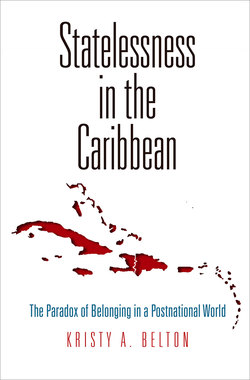Читать книгу Statelessness in the Caribbean - Kristy A. Belton - Страница 9
На сайте Литреса книга снята с продажи.
ОглавлениеPREFACE
This book is about belonging in a world carved into states. It asks us to examine our taken for granted assumption that we all seamlessly fall into place as citizens of one state or another and that we are able to retain the citizenship we acquired at birth throughout our life. Millions of people around the world have no citizenship. They do not formally belong anywhere.
Take a moment and imagine what it must be like not to exist in the eyes of a state’s bureaucratic machinery, not to be protected by national laws, not to have access to—or the ability to exercise—the rights and freedoms that are bound up with a particular state’s citizenship. What must it be like to be physically present, to have tried to make a life in a place, yet to be rejected by the place you consider home? What must it be like to see others, born in the same place that you were, growing up in the same place that you did, be self-determining agents and take advantage of opportunities that come their way because they happen to have citizenship—a status that they hold through no merit or action on their part?
In essence, what is it like to be a noncitizen insider? To be displaced from belonging, even as your roots lie within the same land as the “citizens”?
* * *
I make no pretense to neutrality in this book: I believe that everyone has the right to belong to the community of her or his birth. I believe that the current international system of states that generates and perpetuates statelessness is unjust and I believe that the need to resolve statelessness is one of the greatest tasks and duties that we have in the twenty-first century. Before trying to convince the reader of these positions, however, it is important in a book about belonging and place identity to situate myself in this research project and note my particular subjectivities at the outset. As Ruth Arber reminds us, “We construct ourselves through the other and yet leave that which is ourselves silent” (2010, 57). “We must [therefore] properly define the place from which we speak, the person we are, and the way we might affect, or be affected by, the interpretations inscribed within ethnographic texts” (46).
My “place identity” is shaped by the fact that I consider myself a person who is always coming from elsewhere. I am the “Other” nearly everywhere I have lived (and I have lived in many places). I hold two citizenships, but neither is from the country that I was born in. I was born in a colony that had no citizenship of its own to grant, but I was able to acquire the citizenship of my father’s country. If I had not been able to do so, I could have been stateless. I was born to a Bahamian mother and Bahamian women do not, as I explain in this book, have the same right to pass on their nationality to their children as their male counterparts do. Akin to the Bahamian-born persons of Haitian descent that I interviewed for this study then, I am a Bahamian via “registration.”
Although I identify as Bahamian, I am acutely aware that possessing Bahamian citizenship formalizes my membership, but does not actually make me belong in the eyes of many Bahamians. My skin color, place of birth, and heritage single me out as not really belonging, as coming from somewhere else. I thus have a personal interest in how state membership practices—and society’s acceptance of the “Other”—affect one’s ability to belong and the ways that we can go about ameliorating exclusionary membership practices, especially among those who hold no citizenship from anywhere.
